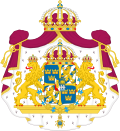Swedish throne
| King of Sweden | |
|---|---|
| Sveriges konung | |

|
|
| Incumbent | |
 |
|
|
Carl XVI Gustaf since 15 September 1973 |
|
| Details | |
| Style | His Majesty |
| Heir apparent | Crown Princess Victoria |
| First monarch |
Eric the Victorious (first monarch of undisputed historicity) |
| Formation |
Unknown (various theories exist) |
| Residence |
Drottningholm Palace |
| Website | The Royal Court of Sweden |
The Monarchy of Sweden concerns the monarchical head of state of Sweden, which is a constitutional and hereditary monarchy with a parliamentary system. The Kingdom of Sweden (Swedish: Konungariket Sverige) has been a monarchy since time immemorial. Originally an elective monarchy, it became an hereditary monarchy in the 16th century during the reign of Gustav Vasa, though virtually all monarchs before that belonged to a limited and small number of families which are considered to be the royal dynasties of Sweden.
Sweden in the present day is a representative democracy in a parliamentary system based on popular sovereignty, as defined in the current Instrument of Government (one of the four Fundamental Laws of the Realm which makes up the written constitution). The monarch and the members of the Royal Family undertake a variety of official, unofficial and other representational duties within Sweden and abroad.
Carl XVI Gustaf became King on 15 September 1973 on the death of his grandfather, Gustaf VI Adolf.
Scandinavian peoples have had kings since prehistoric times. As early as the 1st century CE, Tacitus wrote that the Suiones had a king, but the order of Swedish regnal succession up until King Eric the Victorious (died 995), is known almost exclusively through accounts in historically controversial Norse sagas (see Mythical kings of Sweden and Semi-legendary kings of Sweden).
...
Wikipedia
